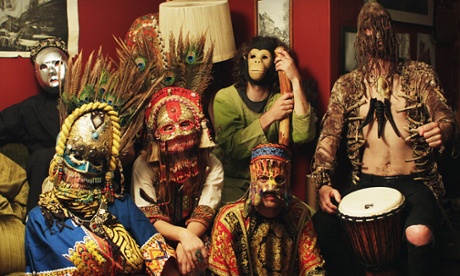
Is it tedious when musicians hide their identities and concoct fanciful biographies? It hasn’t done Daft Punk any harm, but it backfired for Mercury-nominated modern soul duo Jungle, when they were revealed to be merely two well-heeled chaps from west London. Sometimes, being nameless becomes tedious for the musicians themselves, as it has done for Swedish metal band Ghost. “Anonymity makes our lives miserable,” a member said last year.
Also from Sweden come Goat, a sprawling, unidentified collective of freak musicians that sprang from almost nowhere in 2012, weaving together rock, Afrobeat, funk, chants and tribal drums into an intoxicating, psychedelic stew of an album aptly titled World Music. When they hit the road, they did so in ancestral costumes and masks, resembling Dr John at his Night Tripper peak. The BBC beamed them into the nation’s sitting rooms during Glastonbury 2013 and they’ve been on the rise ever since. An equally monumental second album, Commune, is just out, plus they headline the Liverpool International Festival of Psychedelia tonight and play London’s 1,700-capacity Roundhouse on Friday.
Fans clearly couldn’t care less who they really are, but what of the group? Surely by now it must be boring keeping schtum? Goat only do interviews by phone or email, often with amusing results. When asked about the resurgence in psychedelic rock, spearheaded – commercially, at least – by Tame Impala, their response is that the word has come to mean nothing: “By now I guess anyone fits into the psychedelic category, even Lionel Richie.”
You guess that, as impressive as the music is, Goat are also something of a prank. But when the Guide calls, the man who picks up the phone – referring to himself only as Mr Goatman – is deadly serious, genuinely humbled by the group’s success and entirely sure of their intentions.
Commune is an even more ambitious album than World Music, adding the flavours of Malian music to their sonic brew. There’s an instrumental track named after the Haitian Vodou god Bondye, and Goatslaves begins with a vocal sample of Native American political activist and musician, Floyd “Red Crow” Westerman. It’s still, though, very much a psychedelic experience, as Mr Goatman intends: “For me, psychedelia simply represents good music – from 13th Floor Elevators to Joy Division and even someone like John Maus. It represents music that is free.”
In a practical sense, anonymity is useful to Goat, allowing them to mix up the live band without anyone noticing (it’s unknown how many musicians are in the wider collective). But it’s also central to their belief system, which concerns sacrificing the individual for the collective good. Mr Goatman lives in a small commune of two families, and he says some other members of the band also grew up in a commune in a tiny village in northern Sweden (Goat claim the village is under a voodoo curse).
“When you make music in a collective, the individual is unimportant,” he says. “The music I partake in making has little to do with me as a person; there’s something else at play.”
He’s talking about a greater mind, or a “vast seer”, which he describes in this way: “My way of viewing humankind, and everything, is to think of things as an open system. All information is available. So whatever has been reverberates throughout, and what will be is in this openness, too – it’s all together.”
These ideas are taken, in part, from paganism. Mr Goatman defines this as being, “something that represents older or non-conventional traditions”. But there are thorny issues here which, as Goat grow in prominence, they can no longer ignore. In dark corners of Scandinavian music – especially the fringe end of black metal – paganism has become associated with the political far right. “People will always use whatever means they can to achieve weird goals and, yes, the far right has dropped the word ‘paganism’ in the dirt,” Mr Goatman says. “Maybe it’s time to let go of it, look forward and see what we can find.”
Goat have also found themselves having to bat away accusations that wearing increasingly extravagant tribal regalia is, at best, cultural appropriation and, at worst, a kind of cosmic minstrelism. “We love all kinds of music and culture,” Mr Goatman says, audibly upset by the suggestion. “We don’t see people in colours and we feel that what we do is a homage to humanity. The costumes are also about us not wanting to be in the limelight.”
The musicians shrouded behind Goat’s tall tales and masks might look like they have something to hide, but the pantomime serves to convey the band’s intriguing philosophy more effectively than if they were to reveal themselves as just a bunch of stoners from Gothenburg. They’ve certainly no plans to change a thing. Asked whether the mystery is in danger of distracting from the music, Mr Goatman’s voice sharpens for the only time in our conversation. “If it does, I don’t care,” he says. “We are not going to come forward and do an unmasked record like Kiss. For us, it’s unimportant who we are and that’s the way we want to keep it. That’s why we choose to stay anonymous.”
Commune is out now; Goat play the International festival of psychedelia, Liverpool, Sat; touring to Fri

